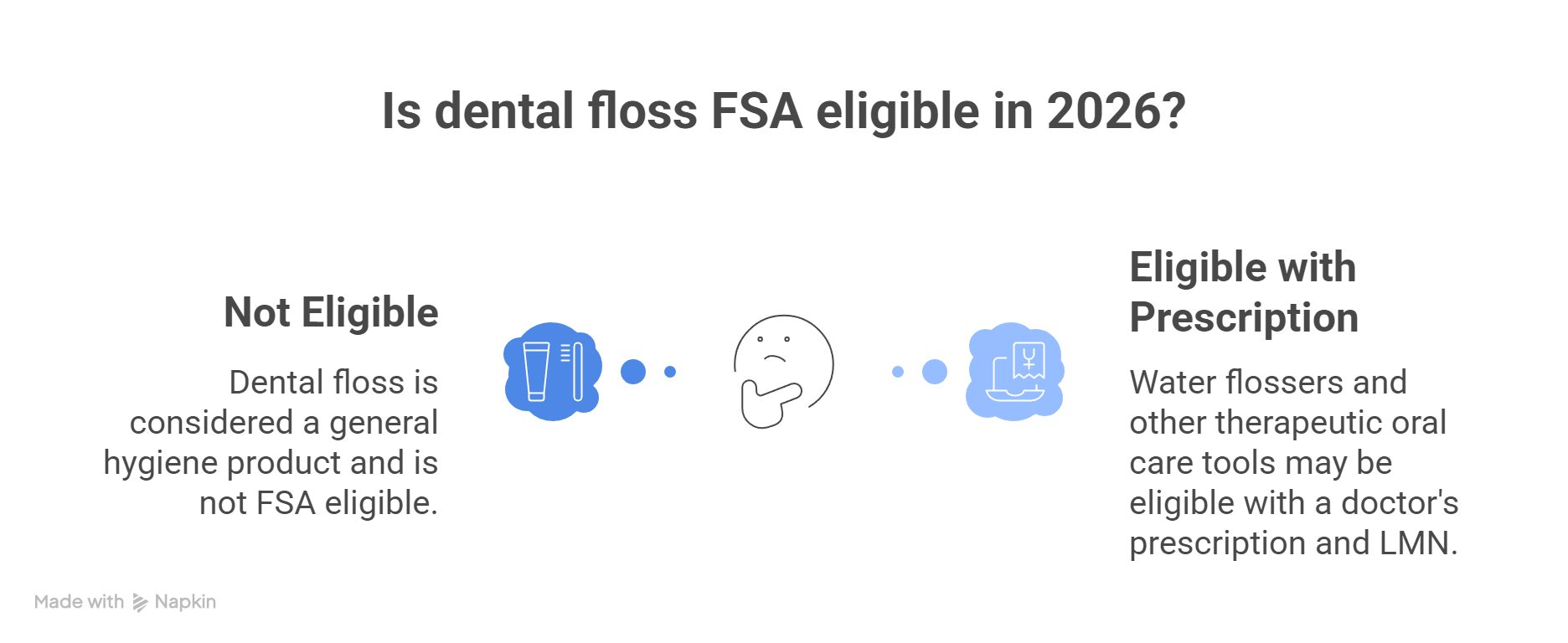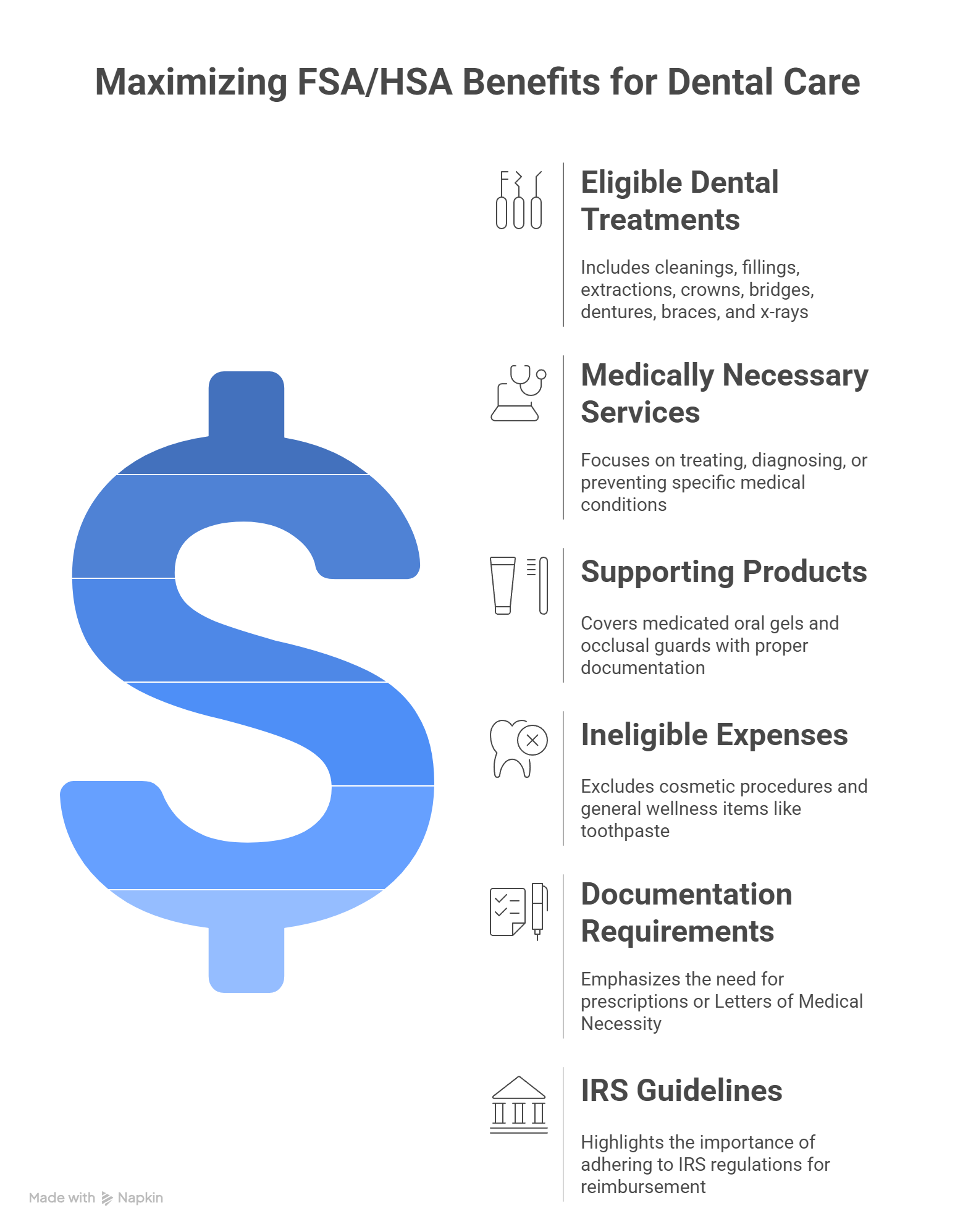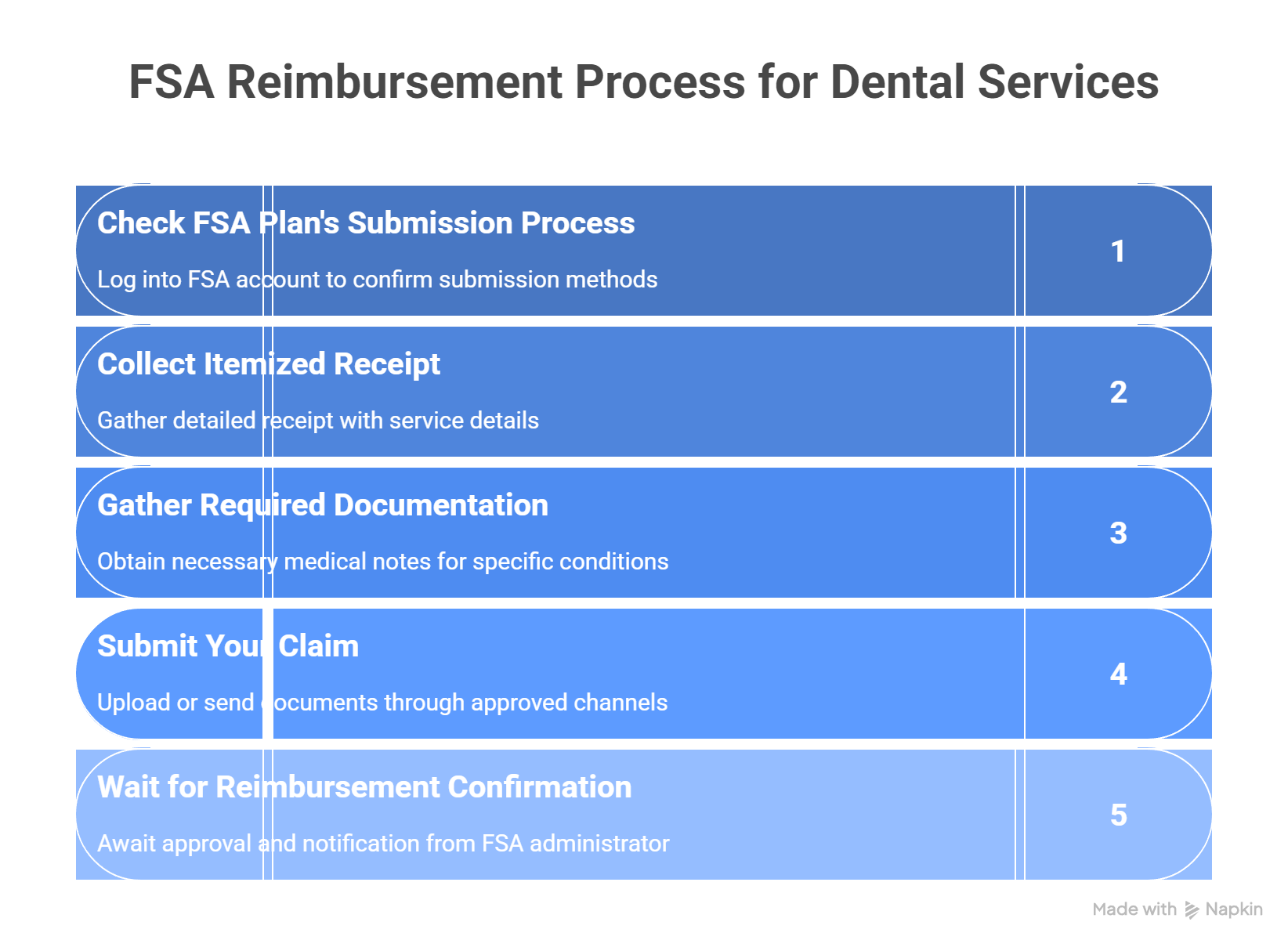Wondering if dental floss FSA eligible products include your daily oral care tools? The short answer is no. Dental floss is not eligible for reimbursement through a Flexible Spending Account (FSA).
Even though it's part of a good hygiene routine, the IRS classifies it as a general wellness item rather than treatment for a medical condition or disease.
In this guide, we’ll review why dental floss does not qualify, what documentation matters (like a note from your dentist), and which dental procedures you can use your FSA money for.
We’ll also cover how Health Savings Accounts work, and why FSAs, unlike Health Savings Accounts, have more limited reimbursement options.
If you're among the many employees who participate in an FSA, understanding how to use your account can help you make smarter choices during your next benefits review.
Key Takeaways
-
Dental floss is not eligible for FSA reimbursement as it is classified by the IRS as a general hygiene product rather than a treatment for a medical condition.
-
A Letter of Medical Necessity from a dentist does not make dental floss eligible for FSA reimbursement, but it can qualify dual-purpose items, like a water flosser, if prescribed for a specific condition.
-
FSA funds can be used for various eligible dental expenses, such as cleanings and orthodontia, providing significant savings for necessary treatments.
Is Dental Floss FSA Eligible in 2026? What You Need to Know

Dental floss is not FSA eligible in 2026. According to the IRS, it’s considered a general hygiene product rather than a treatment for a specific medical condition. That means you can’t use your Flexible Spending Account (FSA) funds to purchase it or get reimbursed, even with a dentist’s note.
While flossing plays an important role in maintaining oral health, it falls under routine preventive care, not a qualified medical expense. The IRS outlines these distinctions in Publication 502, which excludes common hygiene products like:
-
Standard dental floss
These are not covered because they are used for general health and not to diagnose, treat, or prevent a medical issue.
However, some oral care items may qualify under certain conditions. For example, a water flosser can be eligible if your dentist prescribes it for a medical condition such as advanced gum disease.
To qualify, you'll need:
-
A prescription from your doctor, and
-
A Letter of Medical Necessity (LMN) explaining the medical need
This documentation must be submitted along with a detailed receipt. If approved, the item may be reimbursed through your FSA. So while everyday dental floss is not eligible, some therapeutic oral care tools, when properly documented, can be.
Why Dental Floss Isn’t Eligible for FSA Reimbursement
According to IRS Code Section 213(d), only expenses that treat, diagnose, or prevent a specific medical condition qualify for flexible spending account (FSA) or HSA funds. Unfortunately, dental floss doesn’t meet that standard. While it supports oral hygiene, its primary purpose is considered routine and preventive, not treatment for a medical condition.
In IRS Publication 502, the agency outlines which dental procedures and products qualify for FSA reimbursement. Floss, along with toothbrushes and over-the-counter toothpaste, is listed as ineligible because it’s classified as a general health product, not a medically necessary treatment.
Even with a Letter of Medical Necessity from your dentist, dental floss remains ineligible. The IRS guidelines are strict: the product must be used to address a specific medical condition, not just promote overall wellness.
To qualify for FSA reimbursement, an item must meet all of the following:
-
Be directly related to a specific medical condition
-
Serve a treatment purpose, not just prevention
-
Be backed by documentation if required (e.g., prescription or LMN)
This is why other items like fillings, crowns, or x-rays are eligible—they’re tied to medical necessity and clear dental procedures, unlike general hygiene products.
If you're using your FSA or HSA funds, make sure your purchases clearly align with IRS rules to avoid denied claims.
What Dental Expenses Can You Pay for With Your FSA or HSA Funds?

Not everything at the drugstore qualifies, but many dental procedures and medically necessary services can be paid for using your flexible spending account (FSA) or HSA funds. The IRS allows these accounts to cover expenses that treat, diagnose, or prevent a specific medical condition, not just maintain general health.
Common eligible dental treatments include:
-
Cleanings
-
Fillings
-
Extractions
-
Crowns and bridges
-
Dentures
-
Braces and orthodontic procedures
-
Dental x-rays
These are considered medically necessary and therefore qualify for reimbursement under IRS guidelines. The primary purpose must be to address a medical condition, not general hygiene.
Products that support treatment, like medicated oral gels or occlusal guards for grinding, may also be eligible, especially if recommended by your dentist. If documentation like a prescription or Letter of Medical Necessity (LMN) is required, be sure to submit it along with your claim.
Important Notes:
-
Cosmetic procedures are not eligible
-
Items used primarily for general wellness, like over-the-counter toothpaste or toothbrushes, do not qualify
-
Your FSA/HSA provider or employer may offer a searchable list of covered expenses
-
Always review IRS Publication 502 or speak with your dentist before making a purchase
Using these accounts wisely allows you to save money on qualified treatment while maintaining your dental health. Your savings go further when directed toward essential care — not items excluded from reimbursement.
Does a Dentist’s Note Make Dental Floss FSA Eligible?
Even though your dentist might recommend flossing daily, a note or prescription won’t change the eligibility status of standard dental floss.
Under IRS regulations, only expenses that treat or prevent a specific medical condition are eligible for FSA or HSA reimbursement. A product must meet the standard of medical necessity, not just general wellness support. This means your dentist’s recommendation, no matter how strong, doesn’t override the IRS classification.
What does qualify? Dental services and products directly tied to diagnosis or treatment. For example, occlusal guards for teeth grinding or certain prescription oral treatments may qualify when supported by a Letter of Medical Necessity.
When in doubt, review your plan’s documentation, or check with your account administrator before using your funds. Doing so ensures you're using your money on eligible expenses and avoiding denied reimbursement requests.
How to Submit Dental FSA Claims: Step-by-Step Guide

Now that you know which dental services and treatments qualify for FSA or HSA reimbursement, the next step is making sure your claim is submitted correctly. Whether you’re paying for a crown, a night guard, or another dentist-recommended item, submitting complete and accurate documentation is key to getting your FSA funds back without hassle.
Here's how to make sure your reimbursement request is accepted without delays:
Step 1: Check Your FSA Plan’s Submission Process
Start by logging into your FSA account portal to confirm how claims should be submitted. Most plans allow online or mobile app submissions, though some may still require paper forms. Always follow the instructions provided by your FSA administrator.
Step 2: Collect Your Itemized Receipt
You’ll need a detailed receipt that includes the date of service, the name of the provider or dentist, the total amount paid, and a clear description of the product or procedure. Make sure it lists the exact service that was performed.
Step 3: Gather Required Documentation (if needed)
If the product or procedure treats a specific medical condition, such as gum disease or teeth grinding, you’ll need a signed Letter of Medical Necessity (LMN) or a formal note from your dentist. This is especially important for dual-purpose products like fluoride treatments, occlusal guards, or medicated oral gels.
Step 4: Submit Your Claim
Upload or send your documents, including the receipt and any required notes, through your provider’s approved channel. Be sure everything is legible, accurate, and complete. Incomplete claims are one of the most common reasons for delays.
Step 5: Wait for Reimbursement Confirmation
Once submitted, your claim will be reviewed by the FSA administrator. If approved, reimbursement is typically issued via direct deposit or mailed check. You’ll be notified if further documentation is needed.
By following these steps, you improve your chances of a smooth reimbursement process and ensure your FSA account is used properly to pay for eligible dental services tied to a specific medical condition. Always keep copies of everything you submit in case there's a need to reference your claim later.
Final Thoughts
While dental floss doesn’t qualify for FSA or HSA reimbursement, understanding what does can help you use these accounts wisely. Focus your funds on dental procedures, treatments, and medically necessary expenses that meet IRS criteria.
If you're managing gum disease, require specific dental treatment, or need prescribed tools for a medical condition, your FSA or HSA can provide real savings. Just make sure your purchases meet the requirements for medical necessity, and keep the proper documentation ready.
To avoid rejected claims, always review IRS guidelines, check with your employer or account provider, and consult your dentist when needed. Being informed means getting the most from your flexible spending account, while protecting both your wallet and your health.
Frequently Asked Questions
Got more questions? Here’s what to know about dental floss, FSAs, HSAs, and eligibility rules.
Is dental floss FSA eligible?
Dental floss is not FSA eligible as it is classified as a personal expense. Therefore, you cannot use FSA funds to purchase it.
Are water flossers FSA eligible?
Water flossers are typically not FSA eligible unless prescribed by a dentist for a specific medical condition and accompanied by a Letter of Medical Necessity.
How does an HSA differ from an FSA for dental expenses?
An HSA differs from an FSA for dental expenses in that HSA funds can roll over year after year, while FSA funds typically must be used within the plan year or are lost. Both accounts have similar rules regarding medical necessity.
Where can I find a list of FSA eligible expenses?
You can find a list of FSA eligible expenses in IRS Publication 502, or by consulting your FSA administrator for specific guidance. Additionally, FSA-specific online retailers often provide pre-vetted products that qualify.
Are there any "FSA-approved" brands of dental floss?
FSA eligibility for dental floss is determined by the product type rather than the brand, and standard dental floss is not FSA eligible.




































































